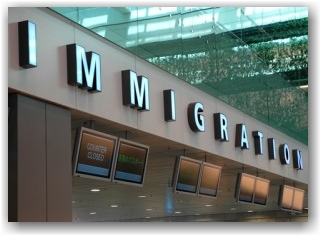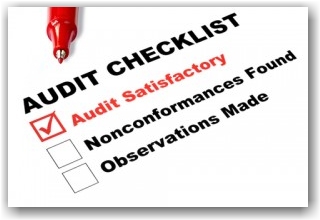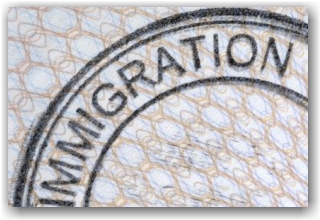Posts Tagged ‘Employment Eligibility Verification’
Monday, January 28th, 2013

A group of 8 bipartisan senators have reached a deal on the outline of a comprehensive immigration overhaul, a development that is long overdue and will assist in framing the forthcoming immigration debate in Congress. Senator Schumer has stated that it is their plan that this can be turned into legislation by March and put into law by mid-late summer 2013.
According to a five-page document released today, the proposal provides a broad-based approach, agreed to in principle by eight senators, that seeks to overhaul the immigration system and create a pathway to citizenship for the nation’s roughly 11 million illegal immigrants.
Although all that we have focused on for years now is nothing else but border and enforcement issues and employment verification, the proposal takes enforcement to the next level by perfecting an entry/exit tracking system, and greater usage of E-Verify or a new and improved E-Verify system that is referred to as “fast and reliable.”
Legislators will create a commission comprised of border governors, attorneys general and community leaders living along the southwest border to monitor the progress of securing the border and to make a recommendation regarding when the bill’s security measures outlined in the legislation are completed.
While security measures are put in place, those who came and remained in the USA without permission, will be required to register with the government. This will include background checks, paying a fine and back taxes to earn probationary legal status to continue to live and work legally in the USA.
Once enforcement measures have been completed, those in probationary legal status will be required to go to the back of the line to wait their turn, pass an additional background check, pay taxes, learn English and civics and demonstrate a history of work in the US and current employment, among other requirements, to earn the opportunity to apply for lawful permanent residency (green-card) status. Those who successfully complete these requirements can eventually earn a green-card (legal permanent residence).
Special provisions will be accorded to the Dreamers (minor children who did not knowingly choose to violate any immigration laws) who will have different requirements that will include a pathway to citizenship.. Individuals who have been working illegally in the agricultural industry performing difficult work for low wages to ensure the safety of the food supply of the US will also be provided special requirements and will have a pathway to citizenship.
Those who graduate from an American University with a Ph.D or Master’s Degree in science, technology, engineering or math (STEM), will be awarded permanent residency (green-card status) to keep the best and brightest talent in the USA.
There are also provisions for a guest worker program referred to as “lower-skilled workers” in the proposal that will meet the needs of employers, the agricultural industry, including dairy, to find agricultural workers and lower skilled immigrants when the economy is creating jobs and fewer when the economy is not creating jobs. If this is the H-2B program, we sincerely hope that it gets an overhaul – it’s entirely too complicated, takes too long and completely discourages employers by overburdening them with excessive details.
Resources
Please see the senator’s attached Transcript. It’s certainly a an introduction to a long-awaited immigration conversation that is achievable – but difficult. A link to a transcript from the President’s speech in NV; and the President’s Immigration Fact Sheet.
What are the differences between the Senate and Obama Plan?
Tags: Agricultural Workers, Border Patrol, border security, Comprehensive Immigration Reform, E-Verify, Employment Eligibility Verification, Entry/Exit System, Guest Worker Program, IMMIGRATION ENFORCEMENT, Immigration News, Immigration Reform, Legal Workforce, Obama NV speech, STEM Students, Unskilled Workers, WORKPLACE ENFORCEMENT
Posted in Agriculture, Comprehensive Immigration Reform, Congress, Immigration Legislation, Immigration News | Comments Off on Senators Pitch Immigration Compromise
Sunday, December 30th, 2012

As 2012 winds down, with year-end planning sessions and budget meetings for 2013, how would you rate your company’s employment eligibility compliance program, as it stands right now? We are not in the bubble bursting business, but we’ve yet to see a compliance program that doesn’t need some upgrading and refinement – no one’s is perfect.
According to new data from ICE, since 2007, employer I-9 audits have increased from 250 to more than 3,000 in 2012. From fiscal years 2009 to 2012, the total amount of fines grew to nearly $13 million from $1 million. Statistics released by ICE in July 2012 stated that overall, $87.9 Million in fines have been imposed on employers for violations. The number of company managers arrested has increased to 238. Widespread employer audits will continue to increase this year. Plain and simple, failing to comply with IRCA’s I-9 rules will continue at a rapid rate, resulting in significant fines, loss of access to government contracts, an onslaught of negative publicity, business closure, criminal penalties and imprisonment.
With all the advice, blogs and articles written about the most complicated 1-page form on the planet, there are some basics – a simple formula that, if implemented, followed and maintained, will greatly enhance your level of I-9 compliance and reflect your company’s genuine desire to get its compliance house in order. This is what we recommend:
- Invest in a comprehensive I-9 audit by a knowledgeable attorney or professional who actually practices in this area of the law. Don’t engage in a self-audit without participating in a thorough training program first. This will cause more harm than good; it’s like the blind leading the blind.
- Following the audit and the review of your report of findings, get trained before the correction process begins. Who should be trained? All those who have hands-on exposure to the I-9 process at all of your organization’s locations…and all those who supervise the process and staff. Make training and reading the M-274 Employer Manual absolute requirements for those assigned to I-9 processing and management.
- Establish a written Compliance Policy. This does not need to be a huge undertaking, but should reflect your company policy concerning the steps you’ve taken to assure a compliant workforce and a culture of compliance at your organization. It will be your road map and reflects that you take compliance seriously. ICE will request this document, amongst many others, should they ever come knocking on your door.
- Appoint a Compliance Guru – one who has a senior level of knowledge, who will monitor your internal compliance program, review your I-9 forms every few months for accuracy and completeness, provide updates and arrange for refresher training on a yearly basis.
- Consult with a trusted professional in the field when questions or challenges arise – don’t guess.
Remember, the key to defending any employment related investigation is to evidence that there is and has been a consistent pattern of responsible, good faith effort on the part of the employer in establishing a compliant workforce. Stay informed, subscribe to our Blog, newsletter, and join in the conversation on our LinkedIn Group I-9/E-Verify: Smart Solutions for Employers. Check out our compliance services and solutions here, and make a concerted effort this year to increase your level of compliance by following the above formula.
Tags: Compliance Policy, E-Verify, Employment Eligibility Verification, I-9 AUDIT, I-9 Form, I-9 Immigration Compliance, I-9 Training, I-9/E-Verify News, ICE, ICE Audit, Immigration compliance, Immigration News, Legal Workforce, Mandatory E-Verify, USCIS
Posted in Comprehensive Immigration Reform, Employer Compliance, I-9/E-Verify News, ICE, Immigration Legislation, Immigration News, OSC, USCIS | Comments Off on I-9/E-Verify: 2013 Compliance Considerations for Employers
Wednesday, December 12th, 2012

The E-Verify home page of the USCIS website has posted news updates for your information, as follows:
1) Florida is the newest state to join the Records and Information from DMVs for E-Verify (RIDE) Program. E-Verify is now checking driver’s licenses and ID cards from the state of Florida when presented as a List B document for I-9 purposes. On June 13, 2011, USCIS launched RIDE. This feature allows the E-Verify Program to validate the authenticity of driver’s licenses presented by employees as Form I-9 identity documents. Mississippi was the first state to partner with USCIS to implement RIDE.
2) E-Verify has redesigned Questions and Answers. The new Questions and Answers provide information to current participants that specifically relates to their role with E-Verify and important topics that may affect their organization. In addition, this new resource includes frequently asked questions and information that is needed before you enroll in E-Verify.
3) Please sign up for the new Employee Rights Webinar for Worker Advocates.
For more information, please refer to our Employer Resource Center and sign up to receive our compliance news, updates and blog posts here
Tags: E-Verify News, E-Verify Updates, Employment Eligibility Verification, FL dirver's license and ID cards, I-9 Form, I-9 Trainining, I-9/E-Verify News, Legal Workforce, USCIS, What's New with E-Verify
Posted in I-9/E-Verify News, ICE, Immigration News, OSC | Comments Off on E-Verify…What’s New
Wednesday, December 5th, 2012

As follows:
•Georgia: Companies employing more than 10 persons must register for E-Verify by July 1, 2012.
•North Carolina: Companies employing more than 100 persons must be registered for and using the E-Verify system on January 1, 2013.
•Pennsylvania: State contractors and sub-contractors must register for E-Verify beginning January 1, 2013 – but only if the project is greater than $25,000.
•Tennessee: Companies employing more than 5 persons must register and begin using E-Verify by January 1st.
Businesses within the above 4 states will need to collect an employee’s Social Security number and E-Verify all candidates before employing.
For more on E-Verify by state, we link here, compliments of LawLogix (www.lawlogix.com).
Tags: E-Verify, E-Verify by State, E-Verify State Regulations, EAD, Employment Eligibility Verification, Federal Contractors, I-9 Form, I-9/E-Verify News, Legal Workforce, New E-Verify State Regulations, Work Authorization
Posted in Federal Contractors, I-9/E-Verify News, ICE, Immigration News | Comments Off on REMINDER: New E-Verify Laws; Some go into Effect January 1, 2013
Thursday, November 29th, 2012
 The National Immigration Law Center released this week FAQ’s concerning worksite rights for DACA employees. The information is very helpful for those who are applying for DACA and for those who have been granted deferred action under the DACA Program. There is also some excellent guidance for employers concerning the I-9 form for DACA new and existing employees, social security cards, employment verification letters, and more. We also link to a previous blog post with updated FAQ information on the USCIS website.
The National Immigration Law Center released this week FAQ’s concerning worksite rights for DACA employees. The information is very helpful for those who are applying for DACA and for those who have been granted deferred action under the DACA Program. There is also some excellent guidance for employers concerning the I-9 form for DACA new and existing employees, social security cards, employment verification letters, and more. We also link to a previous blog post with updated FAQ information on the USCIS website.
Please be aware that this is ‘general’ information only. We always recommend that you seek guidance from a skilled immigration attorney or professional who is familiar with DACA and employer compliance issues. As always, we are available to work with you on your casework and to assist employers with employment eligibility verification issues. Please contact one of our immigration professionals at info@immigrationcompliancegroup.com or call 562 612.3996 and visit our I-9 Employer Resource Center.
Tags: DACA, DACA FAQs, Deferred Action for Childhood Arrivals, DREAM ACT, Dreamers, EAD Card, Employment Eligibility Verification, I-9 Compliance, I-9 Training, I-9/E-Verify News, Legal Workforce, Social Security Cards
Posted in DACA | DAPA, Employer Compliance, I-9/E-Verify News | Comments Off on DACA – Know your Workplace Rights
Monday, November 19th, 2012
 USCIS released I-9 instructions to employers today regarding how to fill out the I-9 form for new and existing DACA employees. There have been many questions and speculations concerning how to handle the Form I-9 with existing employees; thus, this guidance is certainly welcomed. We would advise you to print out the instructions and keep them for reference and attach them to either your I-9 reverifications or your new I-9 forms (whichever is appropriate based upon the instructions) for existing DACA employees.
USCIS released I-9 instructions to employers today regarding how to fill out the I-9 form for new and existing DACA employees. There have been many questions and speculations concerning how to handle the Form I-9 with existing employees; thus, this guidance is certainly welcomed. We would advise you to print out the instructions and keep them for reference and attach them to either your I-9 reverifications or your new I-9 forms (whichever is appropriate based upon the instructions) for existing DACA employees.
Please note also that the DACA website has been updated with new FAQ’s, instructions offered in various languages and Filing Tips.
To review, the DACA initiative offers a two year grant of reprieve from deportation as well as work authorization for unauthorized immigrants who were under the age of 31 as of June 15, 2012 and who can demonstrate that they meet the following criteria:
• Entered the United States before the age of 16
• Have continuously resided in the United States since June 15, 2007 and up to
the present time, and were physically present on June 15, 2012 and at the time
of application
• Are currently in school, have graduated from high school or earned a GED, or
are honorably discharged veterans of the US armed forces (including the Coast
Guard)
• Have not been convicted of a felony, significant misdemeanor, or three or more
misdemeanors; or otherwise pose a threat to public safety or national security
• Entered the country illegally or overstayed their visa prior to June 15, 2012.
You might wish to refer to our previous blog post on DACA and sign up to receive our free newsletters, blog posts and I-9 information and updates.
Tags: DACA, Deferred Action, EAD, Employment Eligibility Verification, I-9 Form, I-9/E-Verify News, Immigraiton Compliance Group, Legal Workforce, USCIS
Posted in Uncategorized | Comments Off on I-9/E-Verify News: USCIS Issues I-9 Guidance to Employers for DACA Employees
Friday, September 28th, 2012

The OSC announced today that they had reached an agreement with a janitorial and facilities management company in Florida that was fined for mishandling the TNC process with the employee. The employer was fined $8800 (back pay and civil penalties) and had to agree to training by the Justice Department on the anti-discrimination provision and training by the Department of Homeland Security on proper E-Verify procedures.
It is imperative that you follow appropriate TNC procedures and supply your employees with the required documentation so that they can resolve TNC issues. Sit down with them, show them the information that you input into E-Verify and make sure that it’s accurate. Provide them with the appropriate TNC notice and SSA or DHS referral letter. Here is an excellent training video that we recommend you use as a tool in your organization.
Check out our employer resource center here: www.I-9Audits.com and our services and solutions here: www-employer-compliance.com. Stay informed and sign up to receive our information.
Tags: Department Of Homeland Security (DHS), E-Verify, E-Verify Training, Employment Eligibility Verification, I-9, I-9/E-Verify News, ICE, SSA, Tentative Noncomfirmations, TNC
Posted in Department Of Labor (DOL), DOJ, Employer Compliance, I-9/E-Verify News, ICE, Immigration News, OSC, Social Security | Comments Off on E-Verify and TNC Resolution
Friday, May 11th, 2012
By Timothy Sutton, Communications Editor | Immigration Compliance Group
 Amendments to The Racketeer Influenced and Corrupt Organization Act (RICO) in 1996 expose businesses to civil liability for knowingly hiring illegal workers. RICO was originally enacted to protect businesses from the influence of the mafia by allowing private enforcement of sanctions against violators of racketeering laws. Today, if a business employs illegal workers both (1) private individuals who are directly and adversely affected by loss or depression of wages due to employment of illegal workers and (2) businesses who are proximately harmed by a direct competitors employment of illegal workers may seek monetary sanctions including attorney’s fees under RICO. Simply, if you are employing illegal workers, your legally employed workers and your direct competitors may sue you for racketeering.
Amendments to The Racketeer Influenced and Corrupt Organization Act (RICO) in 1996 expose businesses to civil liability for knowingly hiring illegal workers. RICO was originally enacted to protect businesses from the influence of the mafia by allowing private enforcement of sanctions against violators of racketeering laws. Today, if a business employs illegal workers both (1) private individuals who are directly and adversely affected by loss or depression of wages due to employment of illegal workers and (2) businesses who are proximately harmed by a direct competitors employment of illegal workers may seek monetary sanctions including attorney’s fees under RICO. Simply, if you are employing illegal workers, your legally employed workers and your direct competitors may sue you for racketeering.
In Trollinger v. Tyson Foods, Inc., legally authorized workers filed a civil RICO class action against Tyson claiming the company and its recruiters had violated the INA by entering into an illegal hiring scheme to pay illegal aliens lower wages to increase profits. The workers claimed that their own wages had been depressed by Tyson’s immigration violations. Tyson prevailed after six long years of civil litigation because the plaintiff’s failed to establish a sufficient causation of their lost wages by Tyson’s hiring of illegal workers. However, this case set out the framework for employees to bring a lawsuit against their employer for hiring illegal workers under RICO.
Because the government holds private businesses accountable for enforcing immigration laws through I-9 compliance, E-verify and various Federal statutes, workplace compliance is essential to protecting your business. Businesses, not illegal workers are held accountable for fraudulent documents, misrepresentations of citizenship, and discriminatory hiring practices.
As “gatekeepers,” of immigration enforcement, employers have a de-facto duty to prevent illegal immigrants from securing employment. To ensure that your business is prepared for RICO lawsuits, ICE audits, and OSC hiring discrimination claims, contact one of our immigration professionals at info@immigrationcompliancegroup.com or call 562 612.3996.
Our Employer Resource Center is very informative – check it out.
Tags: Employment Eligibility Verification, I-9 Form, I-9/E-Verify News, ICE Audits, ICE Investigation, Illegal Workers, Immigration Compliance Group, Legal Workforce, OSC, RICO Act, Undocumented Workers, Worksite Enforcement
Posted in I-9/E-Verify News, ICE, Immigration News | Comments Off on I-9 Form: Can An Anti-Mafia Law Criminalize Your Legitimate Business?
Tuesday, May 8th, 2012
 By: Timothy Sutton, Communications Editor
By: Timothy Sutton, Communications Editor
Like many successful restaurant managers, I worked my way up from the bottom of the employee food chain. That meant with each promotion from bus boy to manager, I was trained by other employees on how to do my job. By the time I became a General Manager, I erroneously believed that being a good manager meant being able to follow established procedures. I soon discovered that this was actually a recipe for disaster.
Auditioning a new waiter is a common practice in the restaurant industry. This entails observing an applicant voluntarily interacting with customers, taking orders, serving food and working with other employees. Typically, the audition ends with a free meal in exchange for the waiter’s time and parking validation if the restaurant is generous. Throughout the industry, restaurateurs believe that this practice limits their liability because the applicant has not yet become an employee in “volunteering,” their time to audition for the job.
However, the M-274 Handbook For Employers instructions on completing form I-9 (Employment Eligibility Form) classifies this practice of meals and parking reimbursement as remuneration: anything of value given in exchange of labor or services, including food or lodging. Because restaurant managers typically train one another on hiring practices, there is a perpetual false belief that auditioning waiters is a healthy hiring practice. According to the M-274, the work done in exchange for the value of a meal exposes restaurants to form I-9 non-compliance fines. Essentially, the audition becomes Day One of employment, which requires I-9 forms to be completed and retained.
If the applicant is not hired, both Section 1 and 2 of the I-9 form must be completed that same-day in order to comply with rules regarding employees retained for three-days or less. Without the proper knowledge and training on these I-9 compliance issues, managers expose their companies to thousands of dollars in fines by auditioning waiters. A successful manager goes beyond following the established procedures by having the foresight to seek professional guidance to ensure that company employment practices are in accordance with the law.
For fresh insight into how your business’s employment practices can become a recipe for success contact our office at info@immigrationcompliancegroup.com or call 562 612.3996.
Please refer to our informative Employer Resource Center for more, and here for a list of our services and solutions.
Tags: Employment Eligibility Verification, Food Service, I-9 Compliance, I-9 Fines, I-9 Form, I-9 Penalties, Legal Workforce, Restaurant Hiring, Restaurants, Undocumented Workers, Waiters, Worksite Enforcement
Posted in I-9/E-Verify News, ICE, Immigration News | Comments Off on I-9 Form: Recipes For Success | Lessons Learned as a Restaurant Manager
Friday, May 4th, 2012
By: Timothy Sutton, Communications Editor 
On May 3rd, 2012, the President reassured the nation of his dedication to reforming U.S. immigration policies. In his speech, President Obama insisted that upon re-election, he would immediately overhaul the current immigration system. Of late, the DREAM act, a pathway for un-documented students to achieve citizenship, has been at the forefront of immigration politics. But while politicians argue over issues regarding individual rights to obtaining U.S. citizenship, businesses are left wondering where they fit into the proposed immigration “system-overhauls.”
Over the last two years, the dramatic increase in I-9 audits by the current administration have been well documented on this and other blogs. Additionally, the White House website clearly outlines the President’s vision for immigration reform, “Demanding accountability for businesses that break the law by undermining American workers and exploiting undocumented workers.”
This week, HerbCo, an agricultural business in the state of Washington, received $1,000,000 in fines for hiring illegal workers. HerbCo Management also received sentences of five years probation after entering guilty pleas to the criminal charges against them. A week prior, a restaurateur in Oakland, California was sentenced to 41 months in prison for improperly reporting the wages of over one hundred illegal workers to the IRS.
These hefty penalties reflect the seriousness of President Obama’s demands for business accountability. If the pathway to legal citizenship becomes more accessible to children, will businesses shoulder more of the blame for facilitating the illegal immigration of their parents? Business owners under the current political climate cannot afford workplace verification non-compliance. For more information on how to prepare your business for upcoming changes to the U.S. immigration system contact our office at info@immigrationcompliancegroup.com or call 562 612.3996.
Tags: Comprehensive Immigration Reform, DREAM ACT, Employment Eligibility Verification, Guest Worker Visa, I-9/E-Verify News, Immigration Legislatoin, Legal Workforce, president obama, Unlawful Presence
Posted in Comprehensive Immigration Reform, Immigration Legislation, Immigration News | Comments Off on Immigration Politics: How Serious Are Demands? | News from Immigration Compliance Group








 Amendments to The
Amendments to The 
